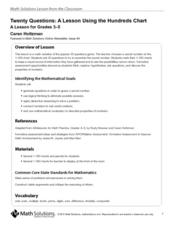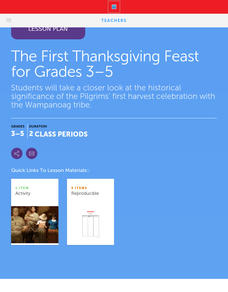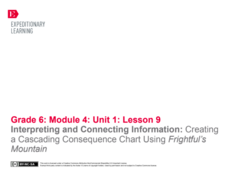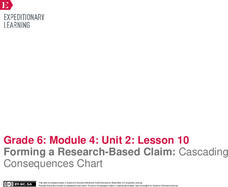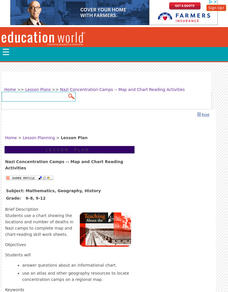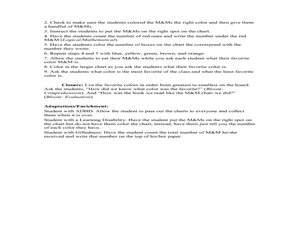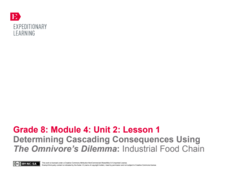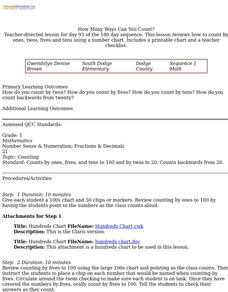Curated OER
Twenty Questions: The Hundred Chart
Use the 20 Questions game to practice math vocabulary and number properties! Project a hundreds chart and hand one out to learners. Ideally, give them counters (beans would work well) to mark off the chart so you can play multiple times....
Curated OER
100 Chart-Math Helper-Skip Counting or Multiples
In this lesson, 100 Chart-Math Helper-Skip Counting or Multiples, learners utilize the chart as an aid in counting. This is a resource or manipulative that can be used by young scholars, and is helpful in many different math activities...
EngageNY
Grade 5 Math Module 1, Topic D, Lesson 10
Take a little bit away. The 10th section of an 18-part unit introduces subtraction of decimals. Scholars use a place value chart like they did with addition of decimals to organize and represent the problem. After using the place value...
EngageNY
Grade 5 Math Module 1, Topic D, Lesson 9
Introduces addition of decimals by using unit notation to represent the problem. Pupils use a place value chart to decompose the numbers and then add before connecting to the standard algorithm.
Scholastic
The First Thanksgiving Feast for Grades 3-5
Scholars examine the first Thanksgiving through books and interviews while they complete a KWL chart. Pretending they are part of the feast, learners craft a scrapbook page that features images related to their experience. Pupils reflect...
Scholastic
Voyage on the Mayflower for Grades 3-5
Following an online activity, scholars complete a Grafitti Wall in which small groups write words and phrases on chart paper pertaining to Pilgrims, the Mayflower, and Thanksgiving. Pupils perform a close reading then answer a series of...
Curated OER
First Grade Math
In this math assessment worksheet, students answer 25 multiple choice questions that pertain to all math skills in grade one.
EngageNY
Scaffolding for Essay: Examining a Model and Introducing the NYS Grade 6–8 Expository Writing Evaluation Rubric
Write it down. Scholars take a close look at essay writing by examining the New York state writing rubric. They then discuss a model essay and compare the model essay to the What Makes a Literary Analysis Essay Effective? Anchor...
EngageNY
Interpreting and Connecting Information: Creating a Cascading Consequence Chart Using Frightful’s Mountain
Decisions, decisions. Scholars take a close look at making decisions by discussing the character Sam in chapters one through eight of Frightful’s Mountain. Partners discuss whether Sam should interact with Frightful and then...
EngageNY
Using Multiple Resources of Information: Creating a Cascading Consequences Chart about DDT and Practicing a Fishbowl Discussion
For every action there is a consequence. Scholars continue their work on creating a cascading consequence chart about DDT using Welcome Back, The Exterminator, Rachel Carson: Sounding the Alarm on Pollution along...
EngageNY
Forming a Research-Based Claim: Cascading Consequences Chart
Is it relevant? Scholars choose a resource from their folders and search for relevant information about the harmful and beneficial consequences of DDT. They mark benefits in one color and harmful effects with another color. They then add...
EngageNY
Forming a Research-Based Claim: Stakeholder Chart on Better Industrial Water Management
It's time to stake a claim! Working with partners, scholars create stakeholder charts for better industrial management of water. As they complete the chart, pupils consider an option for managing water more sustainably, identify...
EngageNY
Forming a Research-Based Claim: Stakeholder Chart on Better Agricultural Water Management
How can industries manage water more sustainably? Building on the previous activity, scholars explore the topic by creating a stakeholder chart for agricultural water management. Next, they participate in the World Café discussion...
EngageNY
Mid-Unit 2 Assessment: On-Demand Informational Writing
Lesson 7 focuses on building academic vocabulary and writing an explanatory letter with supported textual evidence. For the first five minutes of the lesson, the educator reminds the class of how to read and refer to the accordion...
EngageNY
Grade 5 Math Module 1, Topic B, Lesson 5
There is more than one way to write a number. The lesson plan provides teachers with a way to teach reading and writing decimals to thousandths using standard, expanded, and unit forms. Pupils work through in-class and homework...
Curated OER
2nd Grade - Act. 04: What Time Is It?
How do you teach time? Using various stories, 2nd graders will learn about the concept of a daily schedule to develop a sense of self. They will complete a time of day chart and learn about the basic concepts of time beyond a minute....
Curated OER
Under the Sea - KWL Chart
Students create a KWL chart to start the discussion on ocean animals. They practice sorting the animals into their different classifications. They use indexes, table of contents and glossary to find information.
Curated OER
Nazi Concentration Camps -- Map and Chart-Reading Activities
Students use an informational chart about Nazi concentration and death camps to complete a mapping activity and a chart-reading activity.
Curated OER
M&M Counting Chart
Students practice classifying objects while utilizing candy. In this sorting lesson, students observe an assortment of M&M's and analyze the candy based on color. Students create a color chart based on the number of different...
EngageNY
Determining Cascading Consequences Using The Omnivore’s Dilemma: Industrial Food Chain
Which of Michael Pollan's four food chains from his book The Omnivore's Dilemma would best feed everyone in the United States? Using a thought-provoking resource, scholars learn how to create a Cascading Consequences chart to answer the...
Nemours KidsHealth
Sportsmanship: Grades 9-12
The increasing number of unsportsmanlike conduct penalties, red cards, and ejections from games points out the need for activities that help young people recognize behaviors that exemplify good sportsmanship. For homework, class members...
Nemours KidsHealth
Germs: Grades 9-12
Beware the bugs! Two activities engage high schoolers in the study of germs, what they are, what they do to the body, and what can be done to prevent them from spreading. After reading a series of related articles, groups create a...
Curated OER
How Many Ways Can You Count?
Youngsters chorally count to 100 by 1s, 2s, 5s, and 10s, and backwards from 20, using chip markers and a hundreds chart. Includes a printable chart and a teacher checklist for assessing mastery.
EngageNY
Grade 9 ELA Module 1, Unit 1, Lesson 1
Word choice can drastically alter the tone of a piece of writing. Ninth graders read Karen Russell's short story "St. Lucy's Home for Girls Raised by Wolves" and use textual evidence to help them analyze how word choice affects their...
